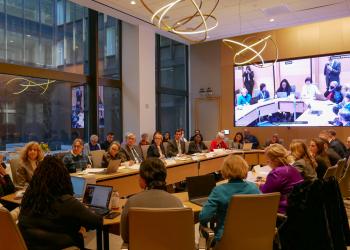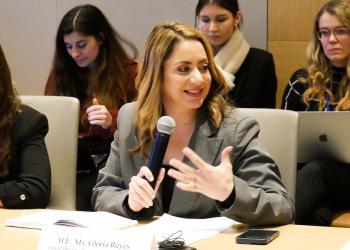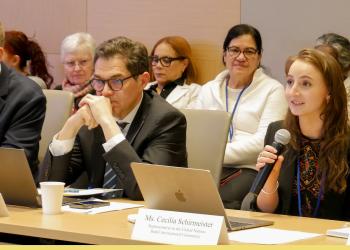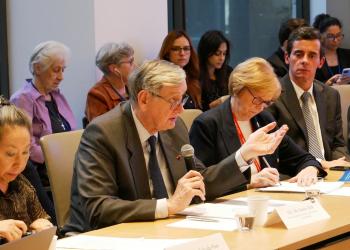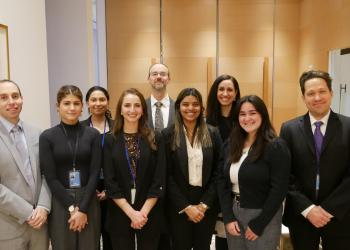Moving from ‘what’ to ‘how’: BIC Collaborates with Ambassadors and Civil Society at UN Commission on Social Development
The 62nd session of the Commission for Social Development (CSocD62) concluded this week, contributing to the global drive for social development and equity.
This year’s session, on fostering social development and social justice, emphasized the critical need for meaningful reflection on the barriers to social progress, as well as success stories around inclusive growth and bridging inequalities.
“What struck me about this Commission is the degree to which the international community is increasingly prepared to move beyond the ‘what’ we need, to question the ‘how’ we can achieve it,” said Daniel Perell, Baha’i International Community (BIC) Representative to the United Nations.
“Moving beyond aspirations to a meaningful exploration of what is holding humanity back is a valuable step in charting a path towards a better world.”
Throughout the Commission, BIC delegates engaged in events and discussions aimed at advancing the social development agenda. Among various initiatives, the BIC opened its offices to a high-level event, “Reviewing Progress on Implementation of the Copenhagen Declaration,” hosted by the Club de Madrid and the NGO Committee for Social Development.
Drawing over 100 participants in person and online, the event featured a variety of panelists including former heads of state, diplomats, professors, and representatives of civil society. Participants explored the Declaration’s commitments to eradicate poverty, ensure full employment, and promote social integration, especially as the second World Social Summit in 2025 approaches.
“We need to speak more at the level of root causes, underlying assumptions, and the fabric of our society, in regard to how human beings relate to each other,” said BIC Representative Cecelia Schirmeister, who helped moderate the event.
“These are the fundamental questions we have to consider and re-imagine in order to effect transformational change,” she added, evoking a world defined not only by high GDP, but also conditions such as access to healthcare, lifelong education, and social cohesion.
The BIC moderated several discussions at the UN over the course of the Commission. One of these events, “Building Shared Societies for Equity and Resilience,” was co-hosted by Club de Madrid and UN DESA. The event featured an esteemed panel of speakers including Danilo Türk, Former President of Slovenia and President of Club de Madrid, Paula Narvaez, President of ECOSOC, and Li Junhua, the Under-Secretary General of UN DESA.
The discussion centered on the need for a fundamental paradigm shift in the way barriers to achieving the Sustainable Development Goals are addressed as well as the critical roles of social protection in education, economic security, gender-sensitive policies, and reducing poverty. Panelists explored the concept of a “shared society,” where universal participation in tackling global inequality becomes foundational.
Daniel Perell also moderated the event “Inclusive Social and Fiscal Policies necessary to achieving poverty eradication and Sustainable Development Goals,” co-hosted by the BIC and the Worldwide Network Nigeria. It focused on the role of inclusive policies, gender equality, and the empowerment of rural communities as a foundation to eradicate poverty and achieve SDGs.
Speaking to the need for inclusive processes at all levels, Perell said, “Ultimately, meaningful consultation—devoid of ego and with the goal of solving a shared challenge—is the one policy that will lead to many inclusive social and fiscal policies.”
